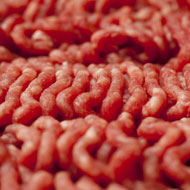Food watchdog testing meats for AMR

Veterinary organisations said AMR is a global issue for both humans and animals, but the agricultural use of antibiotics is "just one piece of the jigsaw".
The Food Standards Agency (FSA) has said it is currently testing meats and other produce for antimicrobial resistance (AMR) and will publish results soon.
The news follows a recent study which found high levels of antibiotic resistant E. coli bacteria in pork and poultry samples from UK supermarkets.
Researchers from Cambridge University tested 189 samples of UK origin from the seven leading supermarkets.
Almost a quarter were positive for ESBL E.coli, which is resistant to critically important modern cephalosporins, while over half of the E. coli found on samples were resistant to trimethoprim. In addition, 19 per cent of the E. coli were resistant to gentamicin.
An FSA spokesperson said: "AMR is a significant threat to public health in the future and consumer safety is a priority for the FSA. Working with others across Government, and with food producers, we aim to reduce the use of antimicrobials in food production animals.
"An important part of that will be work with food manufacturers, assurance schemes and retailers to develop standards for the responsible use of antibiotics in poultry, pig and dairy sectors."
Responding to the study, veterinary organisations said AMR is a global issue for both humans and animals, but the agricultural use of antibiotics is "just one piece of the jigsaw".
A joint statement from the BVA, British Veterinary Poultry Association and Pig Veterinary Society called for greater collaboration between health sectors to preserve essential drugs for the future generations.
'The veterinary profession recognises that antimicrobial resistance is a global problem for both humans and animals, so is working hard with companion animal owners, livestock farmers and other species stakeholders to promote the responsible use of antibiotics.
'Antimicrobials are crucial for the maintenance of animal health and welfare, and there are many innovative and important developments happening in the poultry, pig and other sectors to promote good practice for antibiotic use in animals, and to explore alternative measures. It is essential that we learn from and share this best practice across the UK and beyond.'



 The veterinary mental health charity Vetlife is inviting the veterinary community to join it for a sponsored cold-water dip.
The veterinary mental health charity Vetlife is inviting the veterinary community to join it for a sponsored cold-water dip.